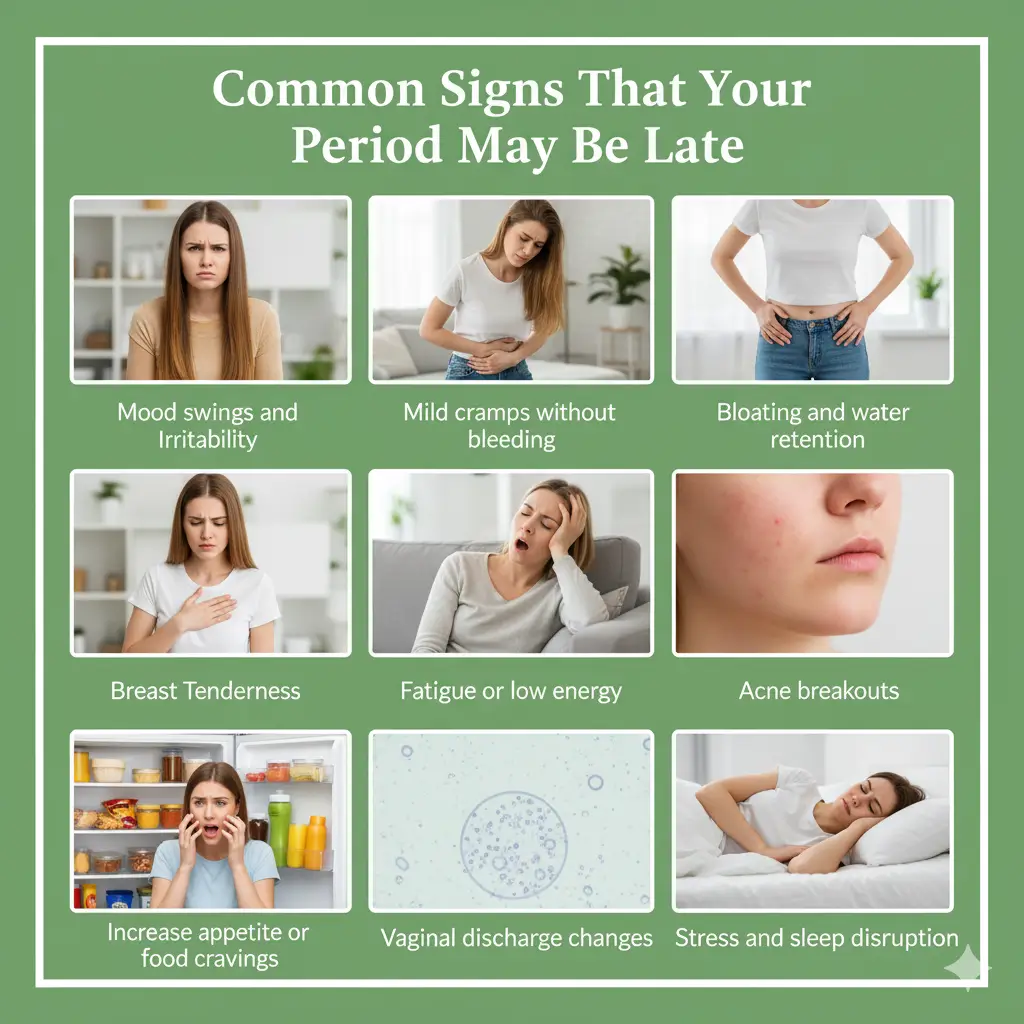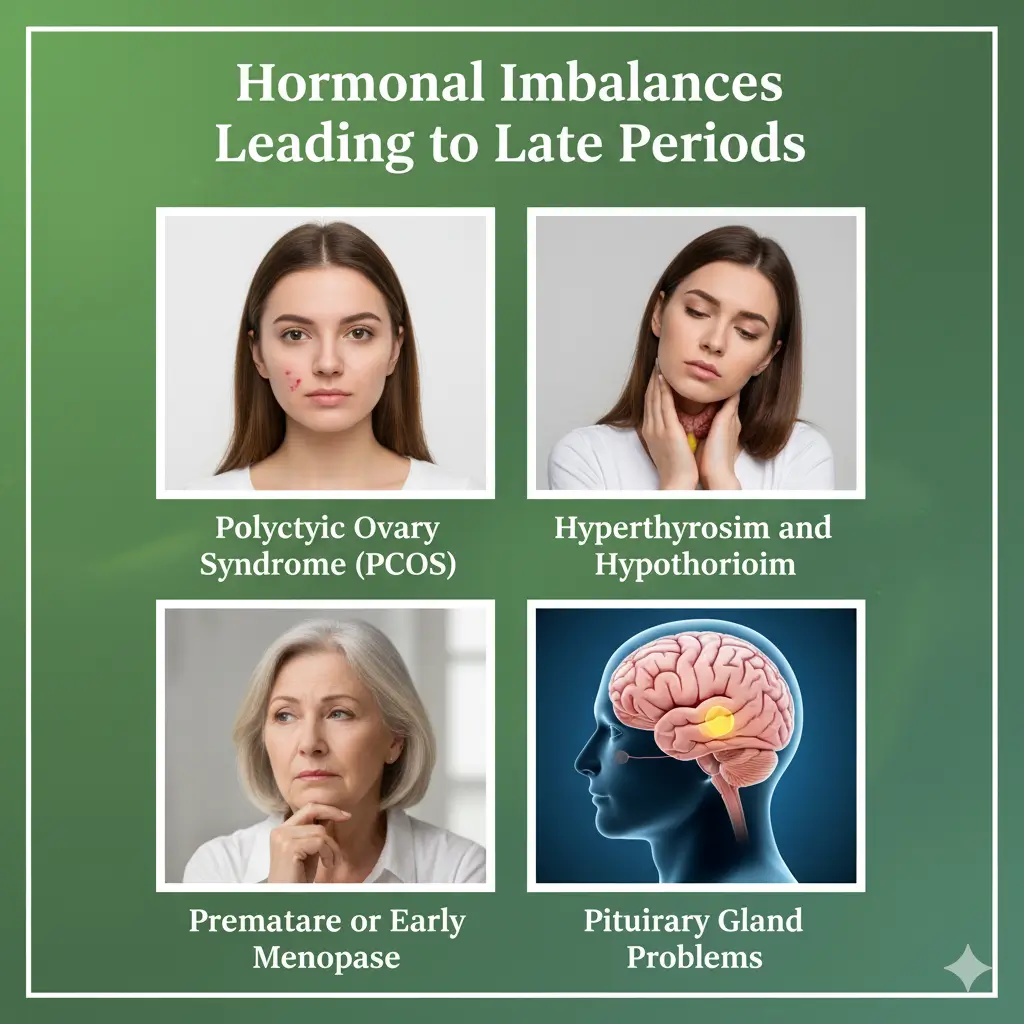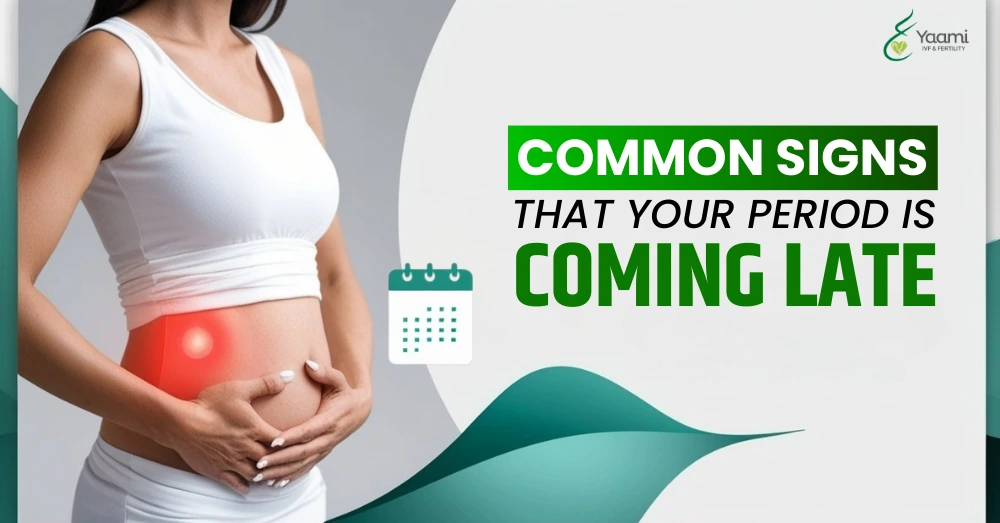Late periods can be caused by hormonal imbalances, PCOS, thyroid disorders, stress, diet, or chronic conditions. Common signs of period coming late include mood swings, cramps, breast tenderness, and changes in discharge. If periods are consistently late, consult a doctor. A pregnancy test is recommended if you’re sexually active and your period is missed.
Periods (menstrual cycle) are a significant aspect of every woman’s well-being. They not only indicate your body’s hormonal balance but also help you to assess your fertility and ovulation.
A regular menstrual cycle usually lasts between 28 and 35 days.
But there are times when your period doesn’t arrive on time, causing confusion, thoughts, concerns, anxiety, and tension.
Sometimes, delayed periods are normal, but they may also indicate hormonal imbalance, pregnancy, or an underlying illness.
Therefore, having basic knowledge about the menstrual cycle and all the possible factors behind an imbalanced menstrual cycle is very necessary. It will not only help you recognize issues at an early stage, but also help you maintain a healthy lifestyle.
Dr. Swati Singh, Reproductive Medicine & IVF Specialist at Yaami Fertility Center, says that women of any age- from teens to women attempting to conceive- have questions such as:
“Why are periods getting late”?
“Is this a sign of pregnancy”?
“What is the sign of period coming late”?
“When should you consult a doctor”?
And answers to these will help you understand your body better and decide your next steps.
Therefore, she has compiled her expertise in this blog to answer everything you need to know about late periods.
What is a Late Period?
A late period refers to when you miss your regular menstrual cycle date, typically more than a week.
For example, if your cycle is normally 30 days and your periods have not arrived even after 35-40 days, then it is considered late.
If your period is delayed, it doesn’t always mean pregnancy, while it can indicate a variety of hormonal or lifestyle factors. In such a case, recognizing the sign of a period coming late can help you differentiate between normal fluctuations and potential health issues.
9 Common Signs of Period Coming Late

According to Dr. Swati Singh, your body sends subtle signs indicating a delayed period is approaching.
Let’s walk through the common signs of period coming late:
- Mood swings and Irritability: Women might feel more emotional and easily irritated than usual.
- Mild cramps without bleeding: Lower belly cramps often happen, but no bleeding has started yet.
- Bloating and water retention: Your tummy feels swollen or heavy for longer than usual.
- Breast Tenderness: During your period delay, your breasts might feel sensitive or painful to touch.
- Fatigue or low energy: Feeling unusually tired or sluggish throughout the day.
- Acne breakouts: More breakouts or oily patches on the skin without a period beginning.
- Increase appetite or food cravings: Stronger urges for sweets or salty snacks continue longer.
- Vaginal discharge changes: Thicker, creamier discharge lasts beyond typical pre-period days.
- Stress and sleep disruption: You might have more stressful and restless nights that affect your cycle timing.
These signs are often subtle and can appear a few days before the expected period.
Early Symptoms Associated with Late Period
You have read the common signs of period coming late, but in certain cases, women might experience some early symptoms that hint at a late period.
Let’s understand them.
- Women might feel stomach discomfort before a delayed cycle.
- Hormonal changes may also trigger tension headaches; therefore, if you are feeling frequent headaches, it might be a sign of delayed periods.
- Instead of completely missed periods, some women may also experience very light spotting instead of a full period.
- Your taste and smell sensitivity might increase due to fluctuating hormones.
Difference Between Late Period and Missed Period
Late periods and missed periods are two completely different conditions. For example, a normal period cycle spans around 28-35 days, and if you get your period later than that, it will be considered a late period. On the other hand, if you have no bleeding or signs of periods ever after a week late in complete cycle, then it will be considered as missed periods.
- Late Period: It means that if your period hasn’t come at its usual time, but it eventually arrives. According to Dr. Swati Singh, your late period could be due to temporary hormonal fluctuations, stress, or diet changes.
- Missed periods: It means that if your periods haven’t come at all for an extended time, usually about 1.5 months or more (one or more full cycles) without bleeding, it is considered missed.
Missed periods are an alarming condition and may require further investigation for pregnancy or underlying health conditions.
Causes of Late Period
According to many studies and data, menstrual cycle irregularities- including late period – can result from many factors that affect a woman’s reproductive health.
Let’s walk through the most common causes of late periods.
- Hormonal Imbalance: Changes or problems in hormones (Like estrogen and progesterone) due to puberty, pregnancy, breastfeeding, and menopause can affect your cycle and cause a late period.
- Polycystic Ovary Syndrome (PCOS): PCOS is a condition with extra androgens (male hormones) leading to irregular or missed periods, often linked to cysts on the ovaries.
- Thyroid Disorders: Both overactive (hyperthyroidism) and underactive (hypothyroidism) thyroid disorders affect hormones and menstrual regularity.
- Extreme Weight Changes or Eating Disorder: Sudden weight loss, gain, or disorders like anorexia and bulimia disrupt the hormonal cycle.
- Chronic Stress: Prolonged emotional or physical stress interferes with the brain hormones that regulate the menstrual period.
- Intense Exercise: Excessive physical activity or athletic training can delay ovulation and periods.
- Chronic Diseases: Conditions such as diabetes, celiac disease, and other chronic illnesses can impact periods.
- Medication: Certain drugs (antidepressants, antipsychotics, chemotherapy, and hormones) can disrupt the menstrual cycle.
- Reproductive Health Issues: Conditions like endometriosis, fibroids, or pelvic inflammatory disease.
When to Take a Pregnancy Test
However, there are no specific guidelines that solely focus on the exact timing to take a pregnancy test, but if you are sexually active and notice signs of period coming late, then you should take a pregnancy test.
Generally, it is recommended to wait one week after a missed period for the exact results.
When to Consult a Doctor for a Late Period
Here are a few points that can help you decide when you should consult a doctor for a late period.
- Period is late for more than 3 months in a row (and you’re not pregnant).
- You have severe pain, heavy and unusual bleeding.
- Unusual symptoms like sudden weight changes, excessive hair growth, hair loss, extreme tiredness, or skin changes.
- Periods suddenly become very irregular or different from usual.
- Trying to get pregnant, and your periods are irregular or missed.
- Periods haven’t started by age 16.
- Face severe abdominal or pelvic pain and unusual bleeding or spotting.
Periods can be late occasionally; it’s usually not serious, but repeated or long delays should be checked by a healthcare professional.
Lifestyle Factors Affecting the Menstrual Cycle
Your lifestyle plays a significant role in menstrual health. Here are some key factors to watch for.
- Poor nutrition, skipping meals, or excessive junk food affects menstrual regularity.
- High stress disrupts hormone balance and can delay periods.
- Moderate exercise helps, but too much intense exercise can stop periods.
- Being too overweight or underweight can cause irregular or missed periods.
- Poor or insufficient sleep disturbs hormones, leading to irregular cycles.
- Excess caffeine, alcohol, and smoking can worsen menstrual problems.
- Working shifts, long working hours, stressful working environment, exposure to light at night, and work-related fatigue affect the menstrual cycle.
Hormonal Imbalances Leading to Late Periods

Hormonal imbalances are a major reason for a late period. Here are the key hormonal causes that can lead to delayed or missed menstruation:
- Polycystic Ovary Syndrome (PCOS): PCOS is a condition where the female body makes too many male hormones (androgens). This causes cysts (fluid-filled sacs) on the ovaries, which disrupts normal ovulation, leading to irregular or late periods. Women with PCOS may also have symptoms like acne, extra hair growth, and weight gain.
- Hyperthyroidism and Hypothyroidism: An overactive (hyperthyroidism) or underactive (hypothyroidism) thyroid gland affects metabolism and hormone balance, leading to menstrual irregularities, including late or missed periods.
- Premature or Early Menopause: When the ovaries stop working normally before age 40, hormone production drops, causing periods to stop or become irregular. This is known as premature ovarian failure or early menopause.
- Pituitary Gland Problems: The pituitary gland controls hormones that regulate menstruation. Tumors and other issues here can stop or delay the period.
- Other Hormonal Imbalances: Disruption in hormones like prolactin (elevated levels), adrenal gland disorder (like Cushing’s syndrome), or congenital adrenal hyperplasia can also cause late or missed periods.
Medical Conditions That Can Delay Periods
Apart from hormonal imbalances, certain medical conditions can also delay periods, such as:
- Endometriosis: Growth of uterine tissue outside the uterus can delay your periods.
- Pelvic Inflammatory Disease (PID): Infection in reproductive organs can also lead to delayed periods.
- Diabetes or Chronic Illness: Diabetes and other chronic illnesses disrupt your hormonal balance, affecting your menstrual cycle.
Impact of Stress and Diet on Menstrual Timings
Chronic stress or stress for a long time can trigger cortisol release, which can suppress reproductive hormones, delaying your ovulation and periods. Similarly, diet affects body weight, energy levels, and nutrient availability, influencing your menstrual cycle.
To ensure timely periods and a balanced menstrual cycle, you should pay attention to a balanced diet rich in whole foods, proteins, and essential vitamins, along with stress management techniques like yoga or light exercise.
Understanding your menstrual cycle and the signs of a delayed menstrual cycle is essential for tracking your reproductive health and identifying potential issues early. While occasional delays are common among women, persistent delays indicate the requirement for expert advice.
Dr. Swati Singh, a fertility specialist at Yaami IVF and Fertility Center, states that by maintaining a balanced lifestyle, managing stress, and seeking medical advice on time, you can ensure better reproductive wellness.
If you are facing delayed periods persistently, seeing multiple signs of period coming late or need help to regulate your reproductive health, then talk to our expert team at Yaami IVF and Fertility Center today.
FAQs
1. What are the common signs of period coming late?
Common signs of period coming late include mild cramps, bloating, mood swings, breast tenderness, fatigue, and changes in appetite or cervical mucus.
2. Can stress delay periods?
Yes, chronic stress can impact hormonal balance and delay ovulation, leading to a late period.
3. Can mild cramps occur even if the period is late?
Yes, mild cramps can occur even with a late period. Hormonal changes and uterine contractions may still cause discomfort.
4. What changes in breast tenderness or mood happen with a late period?
Breast tenderness and mood swings are common before a period, and these can continue or intensify with a late period due to hormonal fluctuations.
5. How does vaginal discharge change before a late period?
Vaginal discharge may become thicker, creamier, or lighter before a late period, often due to changes in hormone levels.
6. Can diet or stress cause a late period?
Yes, extreme diet changes, stress, or significant weight loss or gain can disrupt your menstrual cycle and lead to a delayed period.

Dr. Swati Singh (MBBS, MD – Obstetrics & Gynecology, DNB, FRM, Diploma in Reproductive Medicine and Embryology – Germany) is a leading Infertility Specialist and Gynecologist with over 18 years of experience. As Co-Founder and Senior Consultant at Yaami Fertility & IVF Center, Indore, she offers advanced fertility care including IUI, IVF, ICSI, and management of female reproductive disorders. Known for her compassionate and patient-first approach, Dr. Swati combines global training with deep clinical expertise. She is also actively involved in women’s health advocacy, medical research, and promoting awareness about reproductive wellness and fertility treatments.











